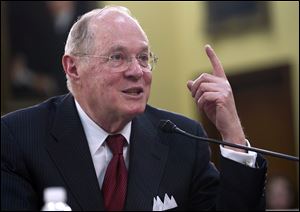
FEATURED EDITORIAL
Law and culture
The rulings underscore that the Constitution reflects changes in public opinion and culture
6/28/2013
Kennedy
THIS week’s rulings by the U.S. Supreme Court on same-sex marriage did not legalize gay marriage, failing to grant a Constitutional right for all couples to marry, regardless of gender or geography. Still, it is a giant step forward.
Two gratifying narrow decisions will help end government-sanctioned discrimination against gay and lesbian Americans. They should prompt Ohio and Michigan, which don’t recognize same-sex marriage, to alter their archaic laws.
READ more Blade Editorials
In an equal protection ruling, the court said that the survivor in a gay marriage should not be subject to a higher inheritance tax than the survivor in a straight marriage. In the second ruling, it said that a California citizens’ group challenging a lower court’s overturning of a gay marriage prohibition in California had no legal standing. California officials failed to appeal the trial court decision against them. So the law in California, first prohibiting gay marriage in that state and now allowing it, stands.
The decisions restored the right to gay marriage in California, but the court did not say there is a constitutional right for same-sex couples to marry.
Both of the court’s decisions reaffirmed that jurisdiction over marriage laws belongs to the states and not the federal government. The rulings, thus, have sweeping implications for the 12 states in which gay marriage is legal. There cannot now be two types of marriage contracts. That’s where the resounding principle of equal protection is applied.
Neither ruling will change the law in Ohio or Michigan. Given likely future challenges, however, that could, and should, change.
Justices struck down the heart of the Defense of Marriage Act, which denied federal benefits to same-sex couples married in places that permit same-sex unions. The act was signed by President Bill Clinton as a means to head off Hawaii legalizing gay marriage.
Writing for the majority, Justice Anthony Kennedy concluded that the Defense of Marriage Act was an unconstitutional deprivation of equal liberty.
Unthinkable only a decade ago, the high court’s rulings did not occur in a vacuum.
Changes in public opinion on gay rights and same-sex marriage, including in Ohio, have come at a lightening pace. The 5-4 decision underscores that the Constitution is a living, breathing document that reflects changes in public opinion and culture.
Over the past two decades, the debate over legal rights for gay Americans has proceeded along three parallel tracks: States debating the criminalization or legalization of gay marriage; the courts sorting constitutional and legal issues relating to equal protection, contract law, and states’ rights; and the changing views of popular culture.
Cultural changes during the past decade have been dramatically accelerated by young people for whom a gay orientation is practically irrelevant — a matter of natural individual differences that should not be suppressed by the government.
One could argue that prejudice against gays has been less stubborn and monolithic than prejudice based on race.
Attitude changes also have been reflected, and perhaps accelerated, by the growing integration of gay people in television and film.
Those changes, in turn, have sparked further changes in the political landscape on gay rights and same-sex marriage. The nation, for example, no longer asks gay soldiers willing to die for this country to hide their loved ones.
In two landmark rulings on gay rights, the court followed deep and traditional principles of the law. But it also followed the people and the culture.
The rulings by no means finish the work of upholding the civil rights of all gay and lesbian Americans. The nation still harbors an oppressive and unworkable hodgepodge of state laws on same-sex marriage.
Still, given the rapid changes in law and public sentiments, it’s only a matter of time before all gay couples are accorded the equality they deserve.